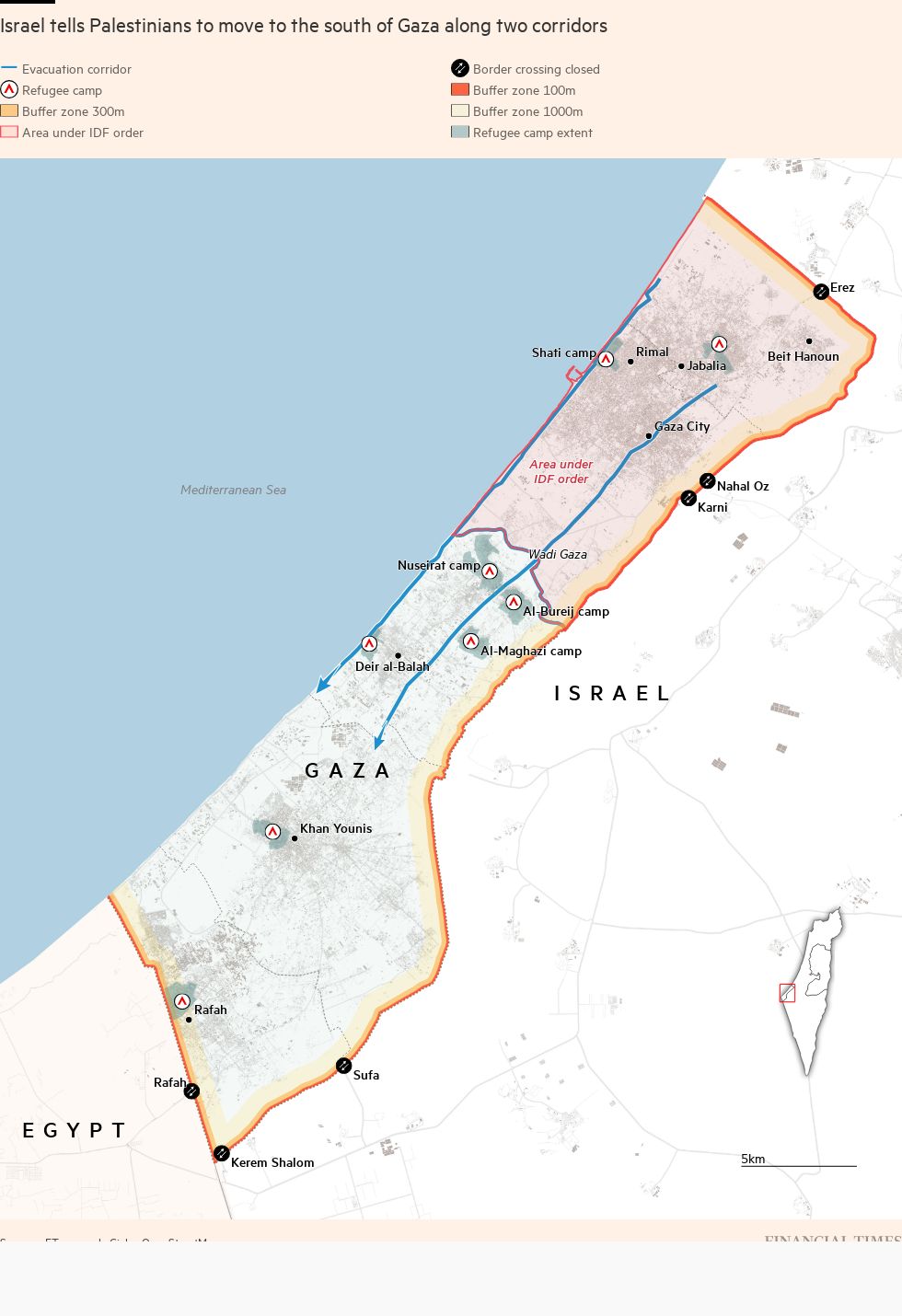Unlock the Editor’s Digest for free
Roula Khalaf, Editor of the FT, selects her favourite stories in this weekly newsletter.
As hundreds of thousands of Palestinians abandon their homes in northern Gaza and flee to the coastal strip’s south, alarm is mounting in Egypt that the deepening humanitarian crisis will be thrust across its borders.
Egypt, the only country other than Israel to share a frontier with besieged Gaza, is already being urged by the US and other western states to allow Palestinians holding foreign passports to exit through its Rafah crossing with the strip.
But Cairo’s main fear is that the longer Israel’s offensive on Gaza continues, deepening the suffering of the Palestinians, the more Egypt will face pressure to accept a flood of refugees into Sinai, a sparsely populated and arid peninsula with a history of instability.
Egypt’s message to western diplomats has been clear: it will deliver aid into Gaza but will resist any push for it to accept large numbers of Palestinians. Sameh Shoukry, Egypt’s foreign minister, on Monday warned that “forced displacement” was no solution to the Palestinian crisis.
In more stark language, a senior Egyptian official told a European counterpart: “You want us to take 1mn people? Well, I am going to send them to Europe. You care about human rights so much — well you take them.”
“The Egyptians are really, really angry” at the pressure on them to take refugees, the European official said, recalling the conversation.
But that pressure is only likely to mount the longer the Israeli offensive lasts, with the Jewish state widely expected to launch a ground incursion into Gaza, an impoverished, densely packed territory that is home to 2.3mn, almost four times the population of the Sinai.
Israeli forces have laid siege to Gaza after an attack by Hamas that killed more than 1,400 people, according to Israeli officials. The bombardment has killed more than 2,750 people in Gaza, surpassing casualties recorded during the 50-day Israel-Gaza war of 2014, according to Palestinian officials.
Israel has also cut off supplies of electricity, water, fuel and goods to the strip, which is controlled by Hamas, and ordered almost half of Gazans to move south from the heavily populated north. UN agencies are already talking of a catastrophic humanitarian crisis.
Benjamin Netanyahu’s warning at the start of the crisis that the Gazans should “leave” has deepened suspicions that the Israeli premier wants to evict them to Egypt, despite denials from the government.
Some European nations have publicly called for the opening of the Rafah border crossing to allow Palestinian civilians to flee, with one Italian minister calling on Egypt to “demonstrate its leadership of the Arab world”.
But Egyptian state media has said that emptying Gaza of its people would “end the dream of a Palestinian state”. It would also absolve Israel of its legal responsibilities as an “occupier”, state media said.
For Cairo, an exodus of Palestinians into northern Sinai is a nightmare scenario that would unleash disruptive pressures it wants to avoid. The region, which has previously been a base of Isis militants, lacks the infrastructure to cope with huge numbers and Egypt is in the grip of an economic crisis.
Michael Wahid Hanna, analyst at the International Crisis Group, noted that there were unanswered questions about what would be considered the suitable number of Palestinians for Egypt during the crisis.
“How many and for how long? And even if it is for temporary humanitarian protection, after the Israeli offensive maybe there will be nothing for the Palestinians to go back to. Or maybe Israel won’t let them return,” he said.
Hanna noted that previous Palestinian displacements had become permanent. Palestinian refugees in Lebanon and Jordan have spent decades in those countries without any prospects of returning to their villages and towns.
Hanna said there were also security factors that were likely to be on the Egyptians’ minds. “Egypt fought an Isis insurgency in the northern Sinai and interlinkages with extremists in Gaza were a key issue then,” he said. Cairo would not want to police an exiled community that could include militants who want to fight Israel from its territory.

Hamas began as an Palestinian faction inspired by the Muslim Brotherhood, which Cairo declared a terrorist organisation after president Abdel Fattah al-Sisi took power in 2013 in a coup backed by widespread popular support that ousted Egypt’s Islamist president, Mohamed Morsi.
While negotiations continue over the crossing, Egypt is allowing trucks loaded with humanitarian aid to mass on the road to the border in the northern Sinai. But nothing has moved, according to senior Egyptian officials, because Israel has refused them entry.
Martin Griffiths, UN humanitarian chief, told the Financial Times that Egypt has been “constructive right from the get go” over aid. But Cairo had drawn the line at allowing an influx of Palestinians through the crossing.
“The Egyptians say: ‘We’d be prepared under certain circumstances to let humanitarian aid into Gaza, but under no circumstances will we let any people without dual citizenship from Gaza into Egypt’,” said a western diplomat.
“The Israelis say exactly the opposite: they say they’re prepared to let out people from Gaza, and a lot of them, but they’re not prepared to allow humanitarian aid in. And we’re stuck now because of this.”
Credit: Source link












